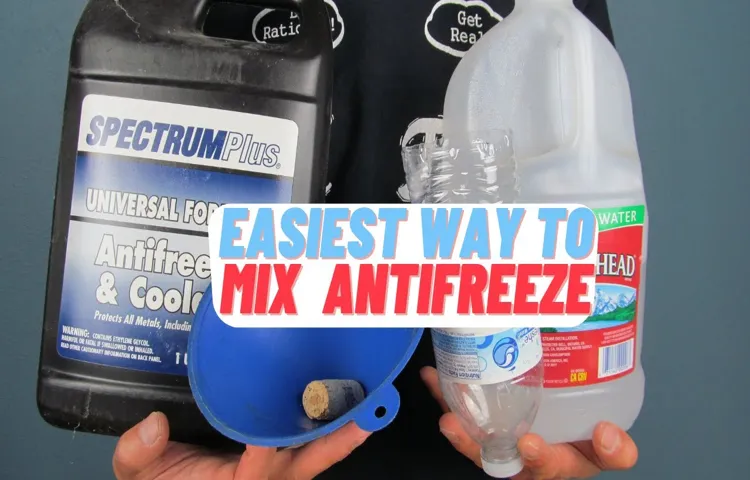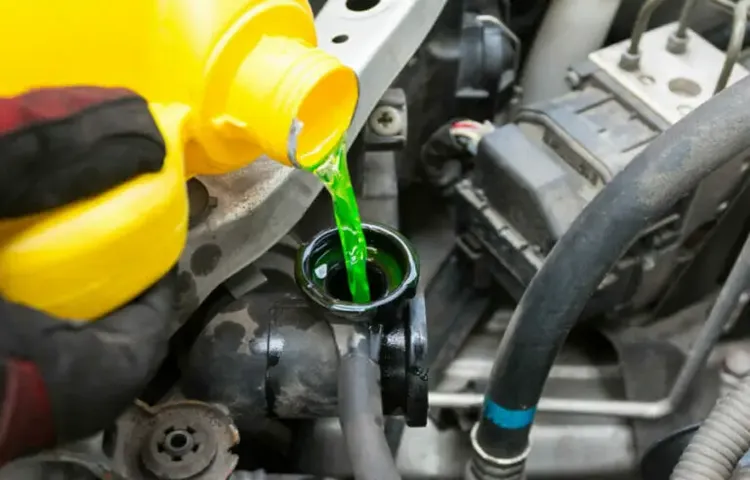Choosing the right water for your coolant may seem like a trivial task, but it can have a significant impact on the performance and longevity of your cooling system. You might be thinking, “Why does it matter what kind of water I use? Isn’t water just water?” Well, not exactly. Just like you wouldn’t fill your car with any old gas, you shouldn’t fill your cooling system with just any old water.
Let me explain why. Think of your cooling system as the engine’s lifeline. It helps regulate the temperature and prevents overheating, which can lead to costly repairs or even engine failure.
Now, imagine if the water you used in your cooling system contained impurities or minerals. These can cause build-up and blockages, reducing the efficiency of the cooling system and potentially causing damage. Using the wrong type of water can also affect the effectiveness of your coolant.
Coolants are specifically formulated to provide optimum performance and protection against rust, corrosion, and freezing. When mixed with the wrong water, the coolant’s properties can be compromised, rendering it less effective in doing its job. So, what kind of water should you use? Ideally, you want to use distilled or demineralized water.
These types of water have been purified, removing impurities and minerals that can be harmful to your cooling system. Distilled water is the purest form of water, as it has been boiled, condensed, and then collected, leaving behind any contaminants. While tap water may seem like a convenient and readily available option, it is best to avoid using it.
Tap water can contain minerals, such as calcium and magnesium, which can not only affect your cooling system but also lead to the formation of scale and deposits in the engine over time. In conclusion, choosing the right water for your coolant is essential for maintaining the health of your cooling system. By using distilled or demineralized water, you can ensure that your coolant works effectively and efficiently, prolonging the life of your engine.
Table of Contents
Why Water is Important in Coolant
When it comes to choosing the right type of water to mix with coolant, it is important to understand why water is important in the first place. Coolant is a liquid that circulates through the engine of a vehicle to help regulate its temperature. Water is a vital component of coolant because it has excellent heat-transfer properties.
This means that it can effectively absorb and transfer heat away from the engine to prevent overheating. When choosing the type of water to mix with coolant, it is recommended to use distilled or deionized water. This is because tap water often contains minerals and impurities that can negatively impact the performance of the coolant and potentially cause damage to the engine.
Distilled and deionized water, on the other hand, have had these impurities removed, making them a much better choice for mixing with coolant.
Water as a Cooling Agent
water, cooling agent, coolant

Water as a Lubricant
water as a lubricant, coolant importance, water-based coolant Water is much more than just a refreshing drink; it plays a vital role as a lubricant in various processes. When it comes to coolants, water is an essential ingredient that cannot be disregarded. Coolants, especially water-based ones, are commonly used in engines, machinery, and industrial processes to regulate temperature and prevent overheating.
Water’s ability to transfer heat efficiently and its low viscosity make it an excellent coolant. It acts as a lubricant, reducing friction between moving parts and preventing wear and tear. Additionally, water has a high heat capacity, meaning it can absorb a significant amount of heat without a drastic increase in temperature.
This property is crucial in cooling systems, as it helps maintain the ideal temperature and prevents equipment from malfunctioning due to overheating. So, next time you have a glass of water, remember its importance not only for quenching your thirst but also for keeping things cool and running smoothly.
Types of Water for Coolant
When it comes to mixing coolant for your car’s radiator, it’s essential to use the right type of water to ensure optimal performance. Tap water may seem like a convenient option, but it often contains impurities that can cause mineral deposits and rust inside the cooling system. Instead, it’s recommended to use distilled water or demineralized water.
Distilled water is purified through a distillation process that removes impurities and minerals, while demineralized water goes through an additional filtration process to remove even more impurities. Both types of water are free from contaminants and minerals that can clog your radiator and reduce its efficiency. So, the next time you’re preparing coolant for your vehicle, remember to use either distilled water or demineralized water for best results.
Distilled Water
distilled water, types of water for coolant
Deionized Water
types of water for coolant, deionized water When it comes to choosing the right water for your coolant, there are a few different options to consider. One popular choice is deionized water, which has been purified to remove impurities and minerals. Deionized water is commonly used in industrial applications where mineral-free water is required.
This includes coolant systems, where impurities and minerals can cause corrosion and clogging. By using deionized water as a coolant, you can help extend the lifespan of your system and reduce the need for maintenance. It’s important to note that deionized water is not suitable for consumption, as it lacks the minerals necessary for proper hydration.
Therefore, it’s important to use it exclusively for non-consumable purposes. So, if you’re looking for a reliable and effective coolant option, deionized water may be just what you need.
Reverse Osmosis Water
reverse osmosis water, coolant, types of water
Considerations when Mixing Water and Coolant
When it comes to mixing water with coolant, it’s essential to use the right type of water. While tap water might seem like a convenient option, it’s not always the best choice. Tap water can contain minerals and impurities that can lead to deposits and clogs in your cooling system.
Instead, it’s recommended to use distilled or deionized water. These types of water have had impurities and minerals removed through a process of purification, making them much purer than tap water. Using distilled or deionized water when mixing with coolant can help prevent corrosion and ensure the longevity of your cooling system.
So, next time you’re topping up your coolant, reach for the distilled or deionized water instead of tap water for the best results.
Avoid Tap Water
water coolant mixture, tap water coolant mixture, water coolant ratio, effects of tap water in coolant When it comes to mixing water and coolant for your car’s engine, it’s important to consider the quality of water that you use. While tap water may seem like the most convenient option, it’s not always the best choice. Tap water can contain impuritie that can negatively affect the performance and longevity of your engine coolant.
These impurities include minerals, chlorine, and other chemicals that can lead to corrosion and rust. To avoid these issues, it’s best to use distilled or demineralized water when mixing coolant. Distilled water has been purified through a process of evaporation and condensation, removing impuritie.
Demineralized water has also undergone a purification process, but it may still contain some minerals. Both options are a better choice than tap water, as they minimize the risk of impurities causing damage to your engine. So, the next time you’re topping up your coolant levels, consider using distilled or demineralized water for the best performance and protection for your engine.
Check the Manufacturer’s Recommendations
mixing water and coolant, manufacturer’s recommendations, considerations. When it comes to mixing water and coolant in your vehicle’s cooling system, it’s important to follow the manufacturer’s recommendations. Different vehicles have different requirements when it comes to the type and ratio of coolant that should be used.
Mixing coolant and water in the wrong proportions can have a negative impact on your vehicle’s cooling system and overall performance. The manufacturer’s recommendations are there for a reason, as they have tested and determined the best coolant to use for your specific vehicle. By following these recommendations, you can ensure that your cooling system is working efficiently and that your engine is protected from overheating.
So, before you decide to mix water and coolant, be sure to check the manufacturer’s recommendations to make sure you are using the right coolant for your vehicle.
Conclusion
In conclusion, when it comes to blending coolant with water, there’s no need to wave the white flag of surrender. You’ll want to find a water partner that can hold its own in the battle against overheating. Forget about tap water, as it may bring a whole army of minerals and impurities to the fight.
Distilled water, on the other hand, is the ultimate secret weapon. It’s been through a rigorous purification process, leaving it clean, clear, and ready for action. So, if you want your coolant to be the superhero of temperature regulation, team it up with distilled water and let them conquer overheating with unrivalled wit and cleverness!”
FAQs
What type of water should I mix with coolant in my car?
It is recommended to use distilled water when mixing coolant in your car. Distilled water is free from minerals and impurities that can potentially clog your cooling system.
Can I use tap water instead of distilled water to mix with coolant?
While it is possible to use tap water in a pinch, it is not ideal. Tap water contains minerals and impurities that can cause scale and corrosion in your cooling system over time. It is best to use distilled water whenever possible.
Is it necessary to mix coolant with water?
Yes, coolant needs to be mixed with water to achieve the correct concentration for optimal cooling performance. The ratio of coolant to water varies depending on the type of coolant and the climate in which you are operating your vehicle.
Can I mix different types of coolant together?
It is generally not recommended to mix different types of coolant together. Different coolants may have different chemical compositions and properties that can react unfavorably when mixed. It is best to stick to one type of coolant and follow the manufacturer’s recommendations.
How often should I check and top-up the coolant in my car?
It is recommended to check the coolant level in your car at least once a month. If the level is low, you can top it up with a mixture of coolant and water. However, if you find yourself frequently needing to top up the coolant, it may indicate a leak in the cooling system that should be addressed by a professional.
What are the signs of a coolant leak in a car?
Some common signs of a coolant leak in a car include overheating, a sweet smell inside the vehicle, visible coolant puddles under the car, or a constantly dropping coolant level. If you notice any of these signs, it is important to have your cooling system inspected and repaired as soon as possible.
Can I use distilled water from a home water purifier to mix with coolant?
Yes, you can use distilled water from a home water purifier to mix with coolant. Just make sure that your water purifier is properly maintained and functioning correctly to ensure that it produces pure distilled water without any impurities.


